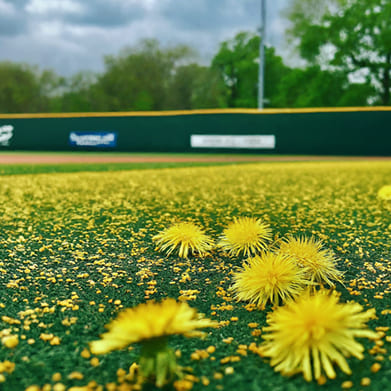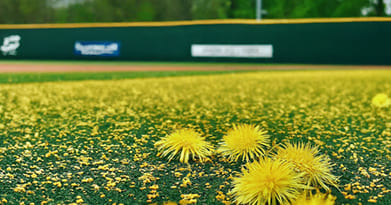
For athletes, peak performance hinges on optimal breathing and clear airways. Unfortunately, seasonal allergies, often triggered by pollen, can throw a wrench into training routines and competition days. I battled with allergies as a long distance runner at Duke University. I had a terrible regimen when it came to allergies. The good news is, with a proactive approach, athletes can minimize allergy symptoms and stay on top of their game.
This guide equips athletes with strategies to combat pollen allergies and achieve top performance:
Identifying the Enemy: Understanding Pollen Allergies
The first step is understanding the foe. Pollen allergies occur when the body's immune system overreacts to harmless pollen, perceiving it as a threat. This triggers the release of histamines, causing allergy symptoms like:
- Runny or stuffy nose
- Itchy, watery eyes
- Sneezing
- Coughing
- Difficulty breathing
These symptoms can make training a struggle and hinder athletic performance.
Know Your Triggers: Pollen Counts and Forecasting
Pollen travels through the air, making outdoor activities the prime culprit for triggering allergies. Different plants release pollen at varying times of the year. Knowing the specific pollen types you're allergic to and their peak seasons is crucial.
Many resources offer pollen forecasts. Websites and apps provide daily pollen counts, allowing athletes to plan training schedules around low-pollen times. Consider scheduling intense workouts for days with lower counts or opting for indoor training facilities during peak pollen season. It is also important to monitor wind speeds, as windy days can spread pollen through the air and exacerbate symptoms.
Minimize Exposure: Pre-Workout and Post-Workout Strategies
Once you know pollen levels are high, implement strategies to minimize exposure:
Pre-workout:
- Check the pollen forecast: Adjust your training based on the pollen count. Consider indoor alternatives or opt for less strenuous exercise on high-pollen days.
- Take medication: Consult a doctor about a daily allergy medication or a pre-emptive dose before high-intensity workouts.
- Lubricate nasal passages: Use a saline nasal spray to moisten nasal passages and trap pollen before it triggers inflammation.
- Wear a pollen mask: A well-fitted pollen mask can significantly reduce pollen inhalation during outdoor training.
Post-workout:
- Shower immediately: Rinse off sweat and any lingering pollen particles that may have adhered to your skin and hair.
- Change clothes: Don't wear sweaty clothes indoors, as pollen can cling to them. Wash workout clothes right away.
- Nasal irrigation: Use a neti pot with saline solution to flush out any remaining pollen from your nasal passages.
Optimize Your Training Environment: Consider Indoor Alternatives
While outdoor training offers numerous benefits, during peak pollen season, consider alternative training environments:
- Indoor Training Facilities: Gyms, fitness centers, and indoor tracks provide excellent options for maintaining your training routine without battling allergies.
- Swimming: Pools offer a fantastic low-impact, full-body workout with minimal exposure to pollen. Take a look at our swimming blog post.
- Early Morning or Evening Workouts: Pollen counts are typically lower in the early morning and later evening. Plan your training sessions accordingly.
Beyond Training: Lifestyle Habits for Allergy Relief
A healthy lifestyle can bolster your body's natural defenses against allergies. Here are some tips:
- Diet: Maintaining a balanced diet rich in fruits, vegetables, and whole grains provides essential nutrients that can help manage allergies. Consider incorporating natural antihistamines like quercetin found in apples, onions, and berries.
- Hydration: Drinking plenty of water helps thin mucus and clear allergens from your nasal passages.
- Sleep: Adequate sleep (7-8 hours per night) strengthens your immune system, making you less susceptible to allergy symptoms.
- Stress Management: Chronic stress can exacerbate allergies. Practice relaxation techniques like yoga or meditation to manage stress levels.
Consult a Doctor: Exploring Treatment Options
If despite your efforts, allergies significantly impact your training or quality of life, consult a doctor or allergist. They can provide a definitive diagnosis, recommend a personalized treatment plan, and discuss options like:
- Allergy shots (immunotherapy): This long-term treatment gradually desensitizes the body to allergens, offering long-term relief.
- Prescription medications: Discuss prescription antihistamines or nasal corticosteroids with your doctor for effective symptom management.
Conclusion: Winning the Fight Against Pollen Allergies
Pollen allergies don't have to sideline your athletic pursuits. By understanding your triggers, employing preventive measures, and exploring treatment options, you can effectively manage allergies and achieve peak performance. Remember, consistency is key. By implementing these strategies, you can breathe easier, train harder, and reach your full athletic potential throughout the year.







